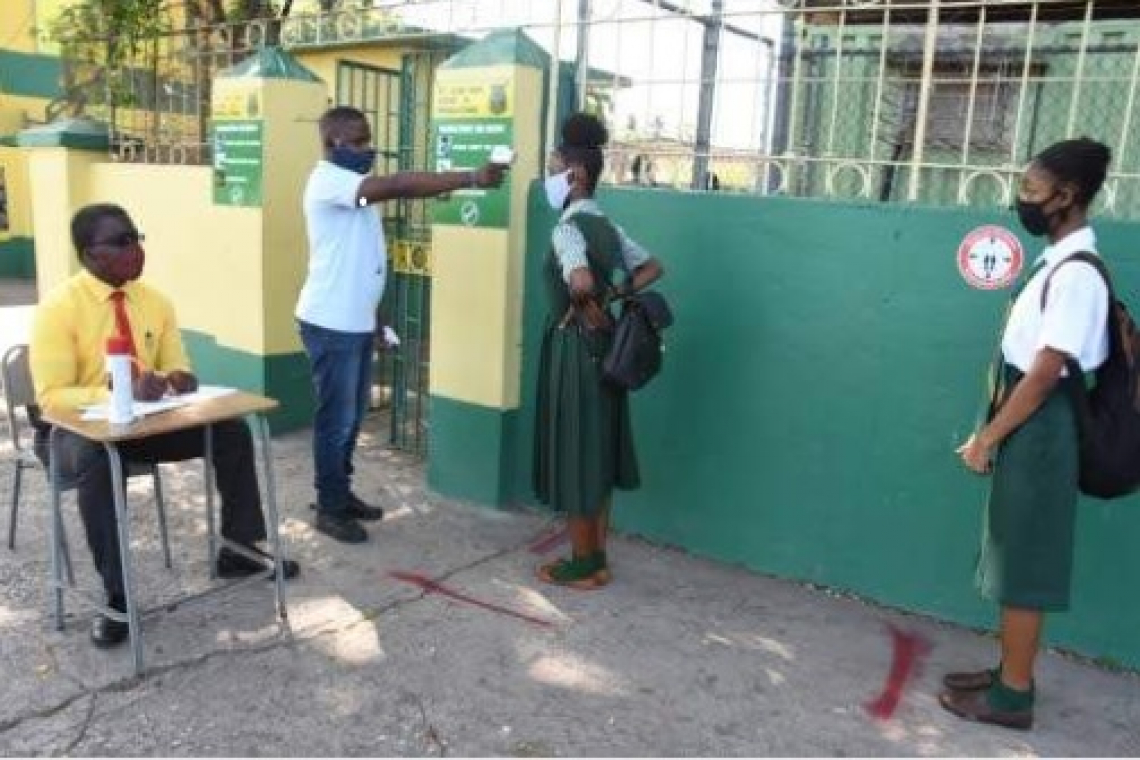Chevoy Matrin (left), guidance counsellor at St. Jago High School, records attendance of students while security officer Rennaldo Brown checks their temperature before they enter the school compound in St. Catherine, in this June 8 file photo. Instead of face-to-face classes students will be engaging in online classes, and in some cases will have lessons delivered by television. Photo credit: Naphtali Juinior.
KINGSTON, Jamaica--Primary and secondary school administrators across the island are anxious about the huge gaps in Internet connectivity and the provision of smart devices for students, with the virtual reopening of school just a few days away.
Despite assurances from the Education Ministry and the roll-out of multiple approaches for teaching and learning, a number of students face the reality of limited or no Internet access for online learning, and there are also concerns about the proposed free-to-air television broadcast of lessons.
Head of the National Primary Schools Principals Association Violet Thomas-Thompson said most primary school administrators are reporting serious challenges.
“The word on the ground is that a number of schools are not ready in terms of connection ... especially in the deep rural areas where there is no Internet. Persons everywhere are having Internet challenges, parents don’t have money to buy the devices, and some homes only have one phone, so children would have to wait until the parent comes back from work. It comes back down to the device; sometimes there is one phone in the home and three children going to three different schools,” she said in a Jamaica Observer interview.
Secondary schools are also facing similar obstacles with Internet access, and the urgent need for devices.
President of the Jamaica Association of Principals of Secondary Schools, Linvern Wright told the Observer that, “In the survey I have done many of the people have connectivity but devices are a challenge for them.” He also said principals have come upon a snag trying to purchase devices, as authorised by the Education Ministry, because there appears to be a shortage on the market.
Education Minister Fayval Williams announced on Tuesday that schools have been provided with funding and tasked to procure laptops for students at Grades 10-13 who are on education grant programme PATH, and for other vulnerable students, as identified.
Opposition spokesman on technology Julian Robinson has criticised the decision, arguing that this should have been left up to eLearning Jamaica as administrators are not procurement specialists.
Wright also pointed out that the administrators were at a disadvantage, given the waiting period involved in the procurement process. “The high demand is something that is causing a shortage right now. Some principals had agreed to procurement because, to be honest, sometimes the ministry itself, because of bureaucracies, tend to take a little longer. What really is happening now is that we are not getting them because there is a worldwide shortage, it appears,” he explained.
He said the central ministry would have been better suited to negotiate the procurement. “They’re in a better position to get them than schools because of their collective power; our view is that it is something that we could have anticipated and done a bit earlier. We believe that these big things are things that they have better leverage on and should’ve had the foresight and used their own leverage to get these things in time,” he said.
At a press conference on Wednesday, where she announced additional support and resources for schools and parents, Minister Williams stressed that eLearning Jamaica would be assisting with coordination of the e-procurement process, and that schools would not be left on their own.
Williams also gave assurances in the House of Representatives on Tuesday that given the multiple approaches that are being taken, students without devices would still be able to access lessons via free-to-air television arrangements, and would be provided with printed material.
But primary school principals said these options still presented a challenge for many families. “Some homes don’t have television and that is the reality in this day and age,” Thomas-Thompson said, pointing out that in some deep rural areas there is no service from one of the two television stations which the government has engaged to broadcast lessons.
She said also that schools are uncertain whether printing of lesson material will be done by the ministry, as they are concerned that they do not have the capacity to print the large volumes of material that would be necessary for distribution to students.
On Tuesday, Williams told a press conference that the ministry has contracted a provider to undertake the printing services to ensure uniformity across the school system. She said the contractor is also in charge of distribution to students, as well as collection of completed worksheets, for return to institutions. “We believe this way it will be seamless, reduce the hassle for teachers, principals and it will be done in a way that we can monitor,” she said. Regarding reports about some primary schools being told that textbooks are not available, the minister stressed that there is no shortage of textbooks.
At the same time, Thomas-Thompson said the utilisation of the Google Suite learning management system (G-suite) for education is “a brilliant idea”, as students will be able to navigate the platform without Internet “so that’s a plus, but it comes back down to devices.”
Meanwhile, she noted that while there may be some provision of virtual learning for students with special needs, there could be some challenges meeting the needs of that cohort. “We are not sure how equipped the teachers are, how trained they are with dealing with situations like that, but I know the ministry has provided training or online learning. So they have been trying to do their part,” she said. ~ Jamaica Observer ~







